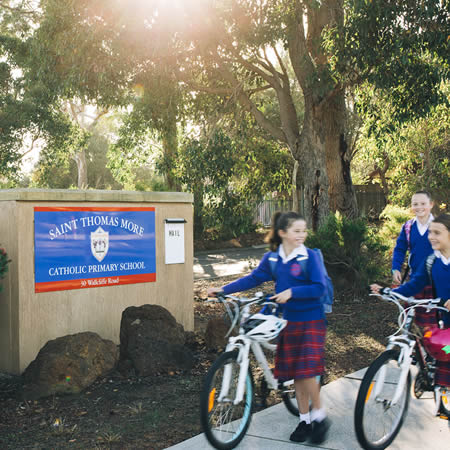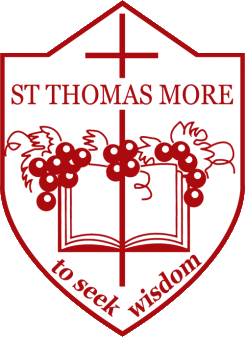Curriculum Learning Areas
Religious Education
The Catholic School is a faith community which includes the Parish Priest and parents as well as teachers and students. It is a place where its members form a relationship with God and where Gospel values such as love, care and forgiveness and the teachings of Christ’s Church are reflected in its policies.
Religious Education is the first Key Learning Area of our school. Our Religious Education program is based on the Perth Archdiocese Units of Work and endorsed by all the Bishops in WA.
Religious Education lessons are conducted daily by each class teacher. The ideals of our Faith are also integrated into other subject areas. Throughout the year all classes will participate in Whole School Masses, class Masses and liturgies. These celebrate and commemorate many different themes in the Catholic Church calendar. Parents are invited to participate in these celebrations.
An important focus for our Religious Education program is the preparation for the Sacraments of Reconciliation, Eucharist and Confirmation. Working in partnership with the Parish and parents, Catholic children in Year 3 will receive the Sacrament of Penance. Catholic children in Year 4 receive the Sacrament of Eucharist and Catholic children in Year 6 receive the Sacrament of Confirmation. Students who are not Catholic will participate in the preparation and then support their classmates receiving the Sacraments. Dates for the Sacraments and Liturgical Celebrations are set at the beginning of each year.
English
The acquisition of language is a developmental process. At St Thomas More, we aim to develop children as language users by fully immersing them in language in all its forms and for all its purposes. We provide whole language programmes which integrate reading, writing, speaking and listening within a relevant and meaningful context.
Children are encouraged to share responsibility for their own personal progress and to think, to question and to evaluate their own performance within the process of language learning. Creative thinking, individual view points and risk taking are encouraged within a success-oriented framework of strategies and experiences integrated across all areas of the curriculum. Whole language programmes offered focus on each child as an individual learner and allow for each child’s literacy development to be carefully monitored and evaluated.
English is taught in a Literacy Block incorporating the areas of Reading, Writing, Spelling, Oral language and Viewing. Handwriting is also formally taught, following the style of the NSW font.
The incorporation of synthetic phonics programs such as the Letters and Sounds program (K-Yr 2) and Soundwaves (Yr 3 – Yr 6) helps build a whole school approach to ensure students are provided the best learning experiences.
The Talk for Writing program is implemented, which is aimed at developing students’ writing skills by first targeting their oral language skills and building upon prior knowledge of texts.
Mathematics
Mathematical knowledge and skills will be acquired by the children in the course of practical activities involving pupil interaction with concrete materials.
The chief aims of teaching activity based maths are to:-
- Set children free to think for themselves
- Provide experiences to discover the order, pattern and relationships of mathematics
- Give children mathematical skills
Our Maths program works to develop positive attitudes to Maths’ understanding, skills, knowledge and other intellectual abilities. Maths lessons involve both written and mental activities. The element of discovery learning often seen as play is of paramount importance in developing the above outlined aims. The meanings of mathematical terms are learnt by usage. Hands-on learning is an important aspect of the Mathematics’ program and used to consolidate concepts taught.
The knowledge and mastery of basic number facts such as times tables, basic number facts involving the 4 processes, metric units of measurement, units of time, calendar skills and units of money is very important as the foundation stones upon which more complex concepts are taught.
Health & Physical Education
Health and Physical Education provides students with an understanding of health issues and skills needed for confident participation in sport and recreational activities. It enables students to make responsible decisions about health and physical activity.
Protective Behaviours are taught as part of the Health curriculum, following the Keeping Safe Protective Behaviours program. Students in Catholic schools are expected to follow this program and all staff have been inserviced in its delivery.
Physical Education is an important part of the curriculum at St Thomas More. Students participate in one lesson per week aimed at specific skill development provided by the Physical Education Specialist and one lesson designed to consolidate new skills and foster team play and co-operation. For many sport units, modified rules are taught to ensure effective skill development takes place. Kindergarten to Year 3 are taught basic co-ordination activities and simplified games. Years 4 to 6 are taught a variety of all major sports.
During the year, children take part in a series of swimming/water safety lessons conducted by qualified instructors at the Margaret River Recreation Centre swimming pool. These lessons are an integral part of our Physical Education Programme and all children are expected to attend.
Each year children participate in Faction Carnivals and also have the opportunity to participate in Interschool Carnival events, usuually consisting of Athletics, Netball, Football and Cross Country running. Our school belongs to the Leeuwin Interschool Sports Association and competes against other schools in the Margaret River region.
Humanities and Social Sciences
Our aim in Humanities and Social Sciences is to develop in the children the concepts, knowledge and attitudes that will enable them to live in their society and environment as responsible Christians.
Units of work covering the areas of History, Geography, Civics and Citizenship, Economics and Business are studied. Our approach is resource and inquiry based – we aim to develop in the children the ability to question, research and to make the appropriate judgments.
Aboriginal Perspectives
Aboriginal perspectives are integrated into many subject areas. This is the study of past and present Aboriginal societies, which includes their history and culture. It is studied in context which promotes respect for all people and places, with an emphasis on understanding spiritual, political, social and economic issues central to Aboriginal societies.
Science
We believe that Science should provide students with a means of learning about themselves and their environment through as many practical first hand experiences as possible. Science should develop in the child attitudes of curiosity, perseverance and enjoyment.
We emphasise a problem solving approach, through inquiry and discovery. The children are guided to observe, measure, describe and to think creatively and responsibly about themselves and their environment through a variety of Science related experiences.
Covering the areas of Physical Sciences, Biological Sciences, Earth and Space Sciences and Chemical Sciences, students are provided opportunities to pose questions, make predictions and invenstigate scientific solutions to problems.
Technologies
In Technologies students learn to apply knowledge, skills and resources in the development of practical solutions to problems. The separate areas of Digital Technology and Design Technology are taught. Students also have access to coding and robotices in these areas. If we are to give our students the best possible education and training for their futures, digital devices, computers and their associated technology are crucial. Students are provided with digital knowledge and skills that will equip them to function effectively in an ever-changing society.
A 1:1 BYOD iPad program operates from Year 3 to Year 6. Students in the earlier years have access to small banks of iPads in the classroom. These devices will be used to support and enhance the teaching programs that are offered at St Thomas More Catholic Primary School. All children have access to the internet. This access is controlled and every effort is made to protect the students from misuse or abuse. Students are taught internet safety and how to use technologies in an appropriate manner thoughout the year.
Music
All classes from Kindy to Year 3 have a weekly classroom music lesson, with Years 4 to Year 6 students having a weekly Music lesson and Band rehearsal. The focus in these lessons is on developing an understanding of the elements of music – rhythm, melody, harmony, form, style and expression. This is achieved by singing, playing instruments (including percussion, keyboards, drums and guitars), moving, listening and responding to music from a variety of styles and cultures. Children learn to read and write music, compose and improvise.
At the end of Year 2, children are offered the choice of learning a musical instrument privately at school. Tutors visit the school and take small groups during school hours. Current instruments that are offered in our Instrumental Program include Drums, Classic Guitar, Piano, Rhythm Guitar, Flute and Voice.
The Arts
Studies in the Arts learning area benefit students by developing creative skills, critical appreciation and knowledge of artistic techniques and technologies in Drama, Media, Music and Visual Arts. The Arts develop a sense of personal and cultural identity and equip the children for lifelong involvement in the appreciation of all forms of expression.
Art education is viewed as an essential part of the total education of the child. All children are naturally creative. The concepts of line, colour, texture, shapes and form and space appear by chance in the artworks of students. These concepts, however, can only be put to effective use after the children have developed an understanding of them through structured, sequential art activities.
Our Art program allows the children opportunities to express their ideas and feelings through techniques of drawing, painting, colouring, print making, collage, paper craft, textiles, weaving, and 3D activities. Through the engagement of and Art Specialist teacher, students are provided the opportunity to learn tequniques, investigate different forms of art, including painting, sculpting, creating and drawing and engage with local artists and artworks.

St Thomas More, Margaret River
The Catholic School is a faith community which includes the Parish Priest and parents as well as teachers and students.
